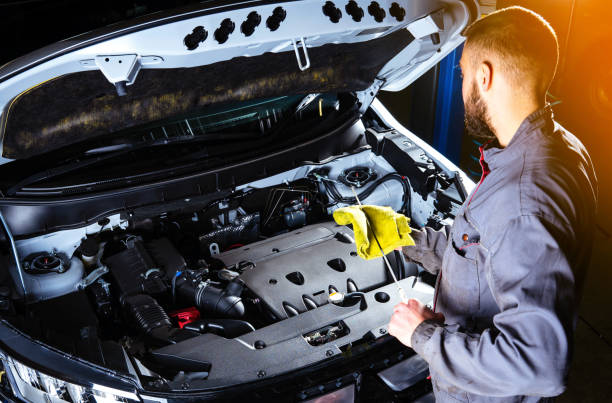Engine diagnostics are an important part of auto repair service, permitting auto mechanics to identify issues and bring back cars to ideal performance. With developments in technology, vehicle service center have actually refined the process of recognizing engine problems, making it quicker and more accurate. Here's a break down of how car service center do engine diagnostics and why this service is crucial.
The Significance of Engine Diagnostics. Engine diagnostics are developed to discover prospective issues that could affect an automobile's efficiency, performance, or safety and security. Routine diagnostics can aid detect problems like lowered fuel effectiveness, harsh idling, or difficult begins prior to they escalate right into major repair services. They are also crucial when an automobile's "check engine" light begins, signifying that something within the system requires focus.
![]()
Step-by-Step Refine for Engine Diagnostics. Consumer Input and Initial Evaluation:. When a vehicle gets to the store, the service technician gathers details from the proprietor regarding any type of symptoms, such as unusual sounds, reduced efficiency, or alerting lights. This input aids lead the analysis process.
Linking Diagnostic Devices:. Most modern cars are outfitted with an Onboard Diagnostics (OBD-II) system, which stores data concerning the automobile's efficiency and errors. Professionals connect an analysis scanner to the OBD-II port, generally located near the dashboard. This scanner gets Diagnostic Trouble Codes (DTCs), which provide insight into potential concerns.
Data Analysis:. Each DTC corresponds to a certain problem, such as an oxygen sensing unit malfunction or a cyndrical tube misfire. Auto mechanics evaluate these codes together with real-time performance data from the engine. This action often entails cross-referencing codes with supplier standards to figure out the specific cause.
Advanced Testing and Evaluation:. If the DTCs do not provide a clear option, specialists may do additional examinations. :
![]()
Compression Screening: Checks the engine's capacity to generate pressure in the cylinders. Vacuum Screening: Detects leaks that could influence engine performance. Gas System Testing: Steps gas pressure and flow rates to make certain the fuel distribution system is working appropriately. Guidebook Checks:. In some cases, a hands-on evaluation of the engine might be necessary. Technicians look for noticeable indicators of damage, wear, or leakages that could not reveal up during digital diagnostics.
Coverage and Repair Works:. As soon as the origin is identified, the mechanic recommends and offers a thorough record repair work alternatives. Whether it's changing a damaged part or altering the system, this step makes sure the problem is dealt with efficiently.
Equipment Utilized in Diagnostics. Auto service center count on a variety of tools, consisting of:
OBD-II Scanners: To interpret and recover mistake codes. Digital Multimeters: For screening electrical components. Oscilloscopes: To evaluate electric waveforms in engine systems. Smoke Machines: To situate leaks in vacuum cleaner systems. Why Engine Diagnostics Are Important. Cost Cost savings: Very early detection of concerns minimizes the probability of expensive repair work. Enhanced Efficiency: Diagnostics make certain the engine runs at peak performance. Ecological Advantages: Taking care of emission-related troubles aids reduced an automobile's carbon footprint. Security: Addressing engine problems quickly reduces the danger of malfunctions or accidents. Verdict. Engine diagnostics are the keystone of effective car upkeep. Vehicle service center make use of sophisticated tools and specialist strategies to discover troubles rapidly, making sure cars stay reliable and safe. Routine diagnostics not just expand an automobile's life-span however additionally give peace of mind for chauffeurs, making them a valuable investment for every single automobile owner.
The Significance of Engine Diagnostics. Engine diagnostics are developed to discover prospective issues that could affect an automobile's efficiency, performance, or safety and security. Routine diagnostics can aid detect problems like lowered fuel effectiveness, harsh idling, or difficult begins prior to they escalate right into major repair services. They are also crucial when an automobile's "check engine" light begins, signifying that something within the system requires focus.

Step-by-Step Refine for Engine Diagnostics. Consumer Input and Initial Evaluation:. When a vehicle gets to the store, the service technician gathers details from the proprietor regarding any type of symptoms, such as unusual sounds, reduced efficiency, or alerting lights. This input aids lead the analysis process.
Linking Diagnostic Devices:. Most modern cars are outfitted with an Onboard Diagnostics (OBD-II) system, which stores data concerning the automobile's efficiency and errors. Professionals connect an analysis scanner to the OBD-II port, generally located near the dashboard. This scanner gets Diagnostic Trouble Codes (DTCs), which provide insight into potential concerns.
Data Analysis:. Each DTC corresponds to a certain problem, such as an oxygen sensing unit malfunction or a cyndrical tube misfire. Auto mechanics evaluate these codes together with real-time performance data from the engine. This action often entails cross-referencing codes with supplier standards to figure out the specific cause.
Advanced Testing and Evaluation:. If the DTCs do not provide a clear option, specialists may do additional examinations. :

Compression Screening: Checks the engine's capacity to generate pressure in the cylinders. Vacuum Screening: Detects leaks that could influence engine performance. Gas System Testing: Steps gas pressure and flow rates to make certain the fuel distribution system is working appropriately. Guidebook Checks:. In some cases, a hands-on evaluation of the engine might be necessary. Technicians look for noticeable indicators of damage, wear, or leakages that could not reveal up during digital diagnostics.
Coverage and Repair Works:. As soon as the origin is identified, the mechanic recommends and offers a thorough record repair work alternatives. Whether it's changing a damaged part or altering the system, this step makes sure the problem is dealt with efficiently.
Equipment Utilized in Diagnostics. Auto service center count on a variety of tools, consisting of:
OBD-II Scanners: To interpret and recover mistake codes. Digital Multimeters: For screening electrical components. Oscilloscopes: To evaluate electric waveforms in engine systems. Smoke Machines: To situate leaks in vacuum cleaner systems. Why Engine Diagnostics Are Important. Cost Cost savings: Very early detection of concerns minimizes the probability of expensive repair work. Enhanced Efficiency: Diagnostics make certain the engine runs at peak performance. Ecological Advantages: Taking care of emission-related troubles aids reduced an automobile's carbon footprint. Security: Addressing engine problems quickly reduces the danger of malfunctions or accidents. Verdict. Engine diagnostics are the keystone of effective car upkeep. Vehicle service center make use of sophisticated tools and specialist strategies to discover troubles rapidly, making sure cars stay reliable and safe. Routine diagnostics not just expand an automobile's life-span however additionally give peace of mind for chauffeurs, making them a valuable investment for every single automobile owner.
Navigation
Home
Latest Posts
Explore New Nissan Models Near You
Published Dec 24, 24
1 min read
Discover Modern Nissan of Lake Norman
Published Dec 24, 24
1 min read
Affordable Nissan Vehicles for Every Need
Published Dec 24, 24
1 min read